Last updated on March 2nd, 2025
Whether one radiator is not working or two or more, a cold radiator means there’s a problem with your central heating system that needs to be fixed to get the hot water flowing again. I have been a full-time heating engineer for over a decade and have fixed countless radiator problems over the years.
Why won’t my radiator heat up?
Reasons for a radiator not heating up:
- Valve is turned off
- Needs bleeding
- Airlock
- Needs balanced
- Valve is blocked
- Full of sludge
- Thermostatic valve pin stuck
Valve turned off
Make sure both valves are fully open. It’s easy to see if a thermostatic valve is open or closed but with a lockshield, you’ll need to try turning it to find out. Radiator valves need to be turned anti-clockwise as far as they will turn to open. A valve could also be faulty or blocked and you might need to replace the radiator valve.
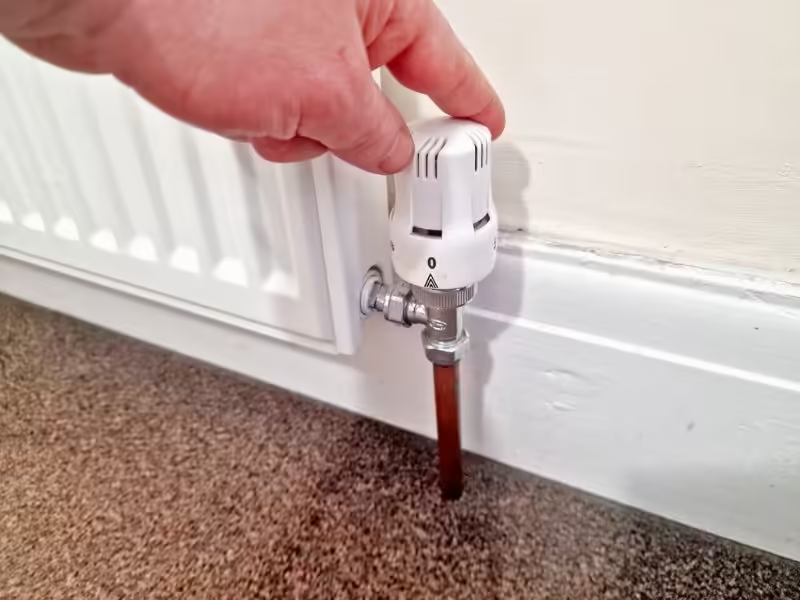
Bleeding
Another reason for a radiator not working is that it’s full of air and needs bleeding. A sure sign it needs bleeding is when the radiator is cold at the top. You must bleed the radiator with a bleed key or screwdriver to fix this and repressurise the boiler. If the radiator is not getting hot after bleeding then this means it’s another problem causing the radiator to not get hot.
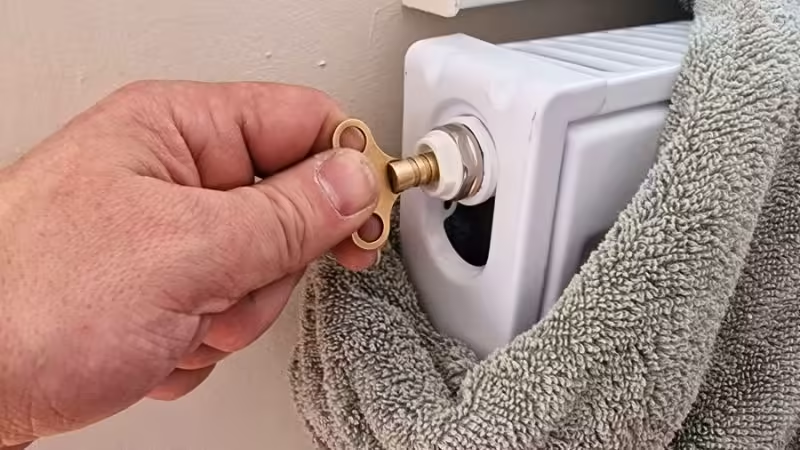
Airlock
An airlock is a common cause of a radiator or two not heating up, especially after draining the system. Whenever I drain a heating system and refill it and a radiator is not heating up, it’s because of an airlock in the radiator pipes. To fix this, you must close one of the valves on every radiator apart from the ones not heating up. This will force the heat to the cold radiators and force the air out. Then open all the other valves back up.
Balancing
Balancing radiators on a heating system is sometimes needed, especially on larger systems. When radiators need to be balanced, it’s usually because one or more radiators aren’t getting any heat or they’re not heating up enough. The heat can be manipulated and spread out evenly across the system by partially closing the lockshield valves.
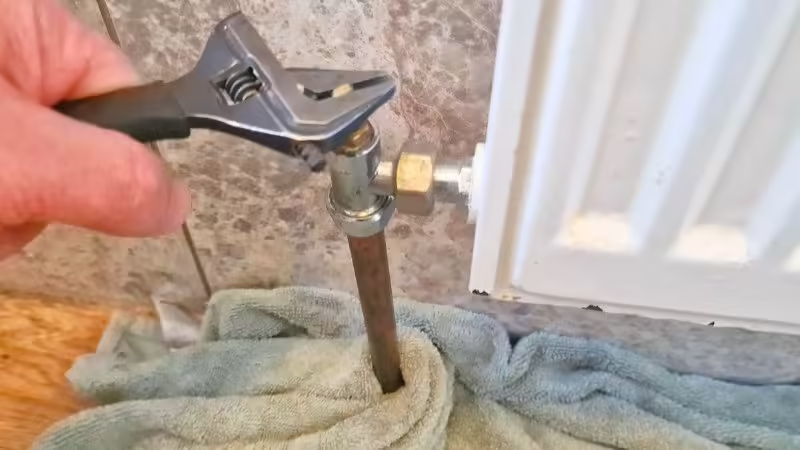
Blocked valve
A blocked valve will cause the radiator to not heat up. It’s hard to tell if the valve is blocked without removing it. You’ll need to drain the system, remove the valve to check for any dirt or debris, and clean it out or replace it if it’s faulty.
Sludge
A radiator being cold at the bottom or cold in the middle is a big sign that it is full of sludge. Sludge typically builds up on the bottom of the and causes the radiator to be cold. You will need to flush the heating system to fix this, or you can remove the radiator and clean it out with a hose if it’s only one radiator.
Thermostatic valve pin stuck
It’s quite common for the pin on a thermostatic valve to become stuck down which will cause the radiator to stay off.
To fix this you can:
- Remove the head by unscrewing the ring anti-clockwise
- Squirt on some silicone lubricant
- Tap the side or top of the valve with a heavy tool
- Grip the pin with some pliers and twist it back and forward
- Pull the pin up gently
- Once up, push it down a few times to make sure it pops back up
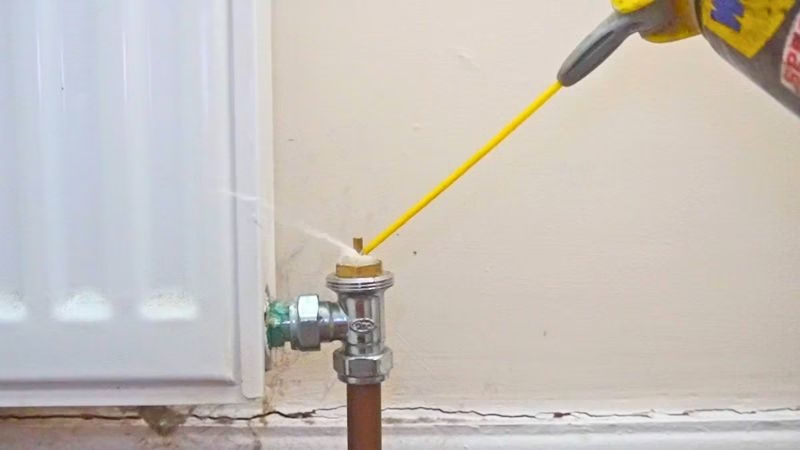
Not working properly
Sometimes a radiator will get heat but not work properly.
The most likely causes:
- Cold at the top: Needs bleeding
- Cold in the middle: Full of sludge
- Cold at the bottom: Full of sludge
Hot at the bottom cold at the top
When a radiator is getting hot at the bottom but cold at the top, it’s because there is air in the top that needs to be bled out. Bleeding the air out will fill the top with water and stop it from being cold.
Hot at the top cold at the bottom
A radiator cold at the bottom when it’s hot at the top is a common sign of sludge in the radiator, and probably in other radiators. Sludge in the radiators means the heating system needs to be flushed. You can also remove the radiator and flush it out individually with a garden hose.
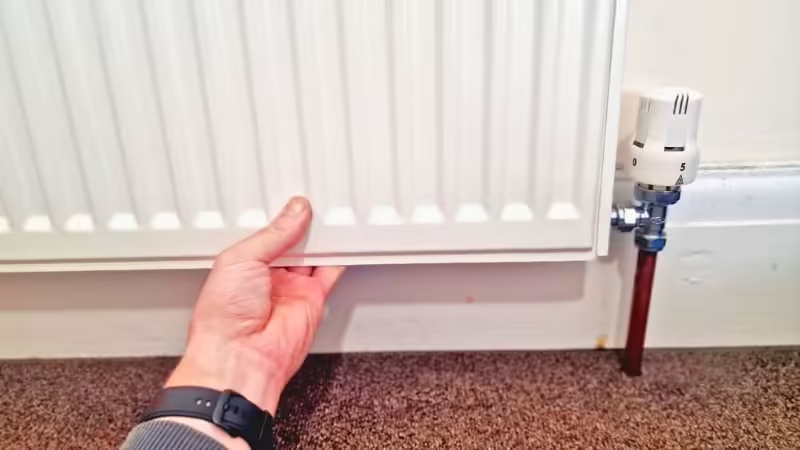
Should both pipes on a radiator be hot?
Yes, both pipes on a radiator should be hot. When the heating is first turned on, only the flow pipe will be hot until the radiator has heated up. Both pipes should eventually get hot as the hot water leaves the radiator and heads back to the boiler.
Is your radiator piped up correctly?
A newly installed radiator not working is a sign that it hasn’t been piped up correctly or the new pipes are too small. For example, if you have added a new radiator and connected it to old 10mm pipes to supply the new radiator, this will cause the radiator not to work properly if at all. If the radiator used to get hot but has stopped, you can rule out not being piped correctly.
Summary
Fixing a radiator is usually straightforward but sometimes you have to bite the bullet and change the radiator. If the cold radiator has been hot before you can rule out a pipework problem and if you just drained the heating system then it’s almost certainly an airlock.
Having just the downstairs or upstairs radiators working will most likely be caused by a zone valve or thermostat problem.
Have any questions? Drop them in the comments below, I’ll do my best to help! If you found this post helpful, don’t forget to share it with others who might benefit.
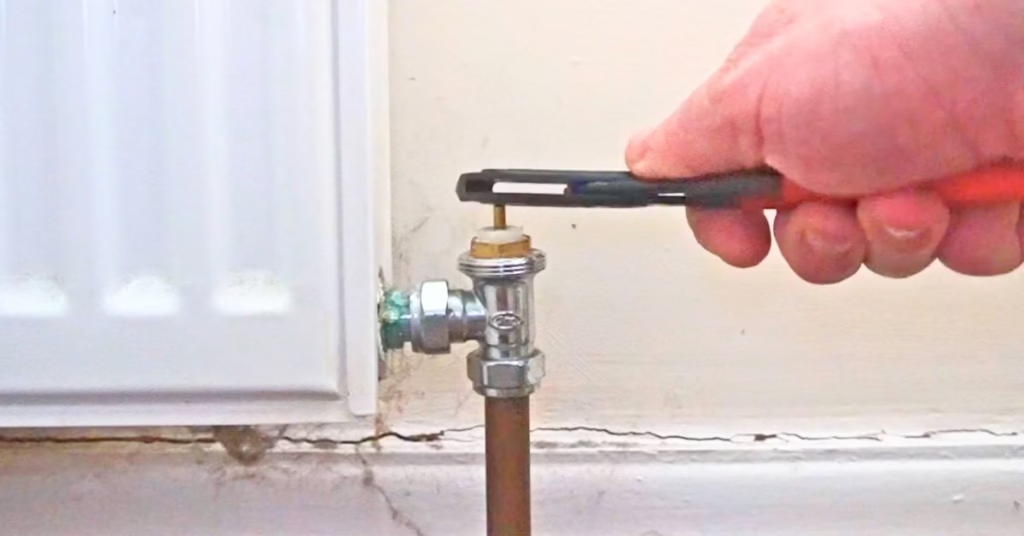
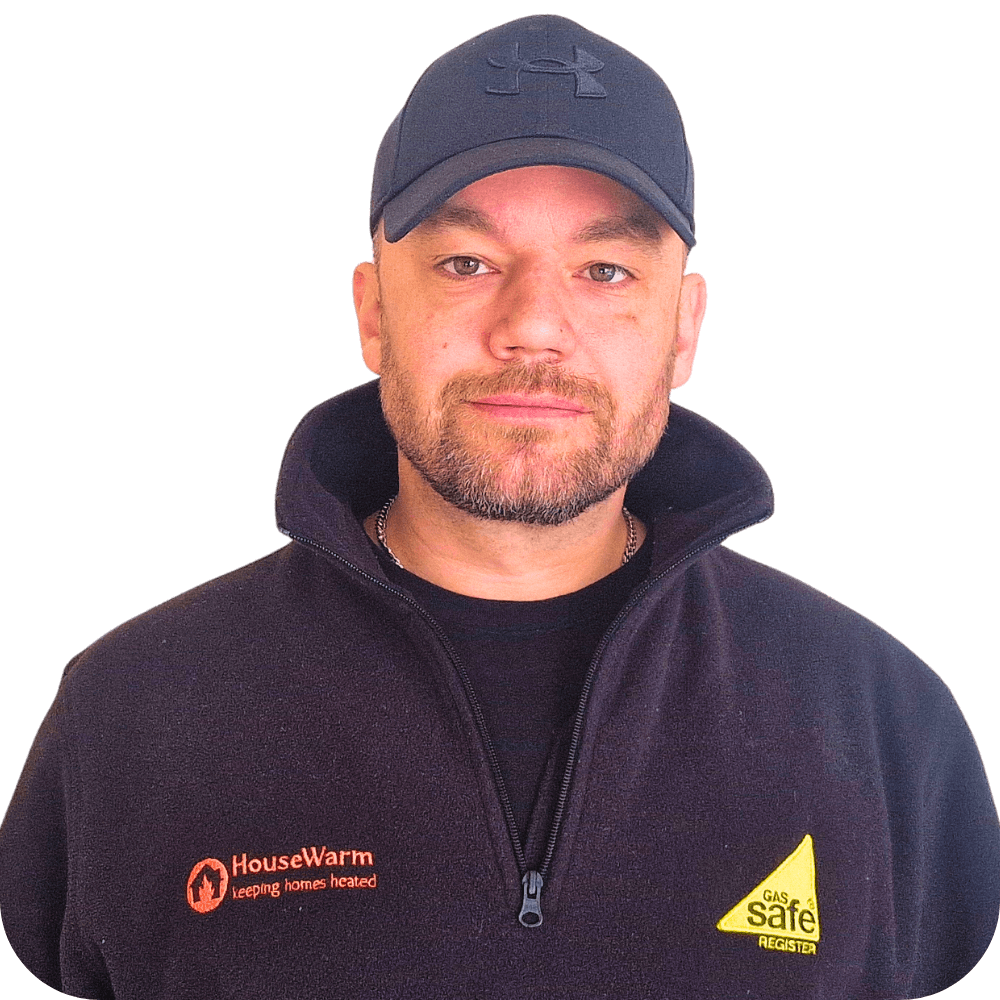
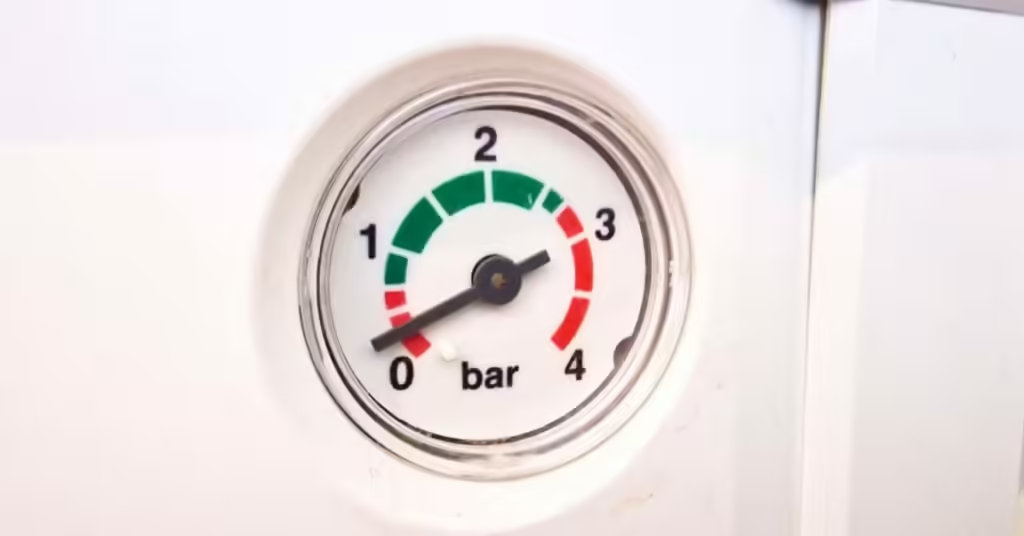
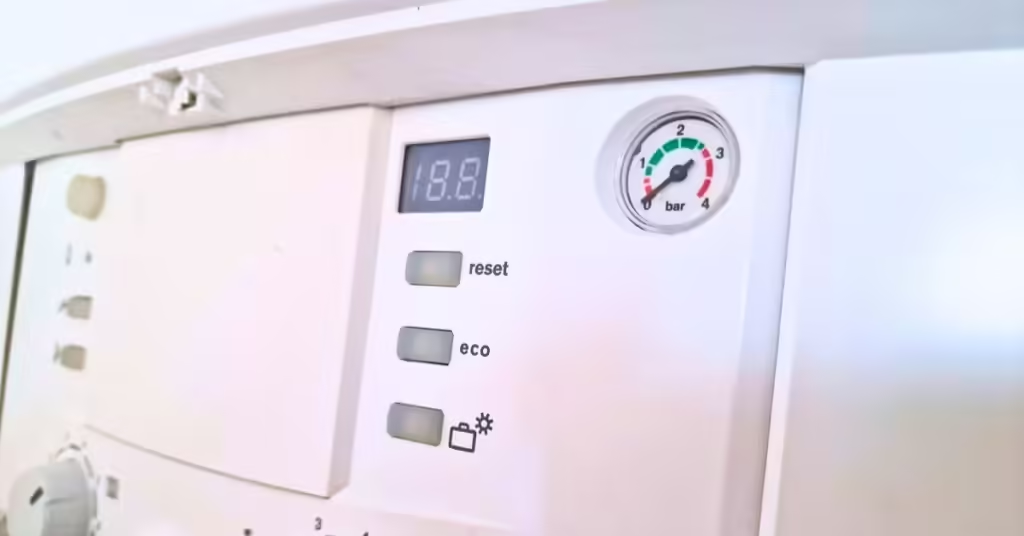
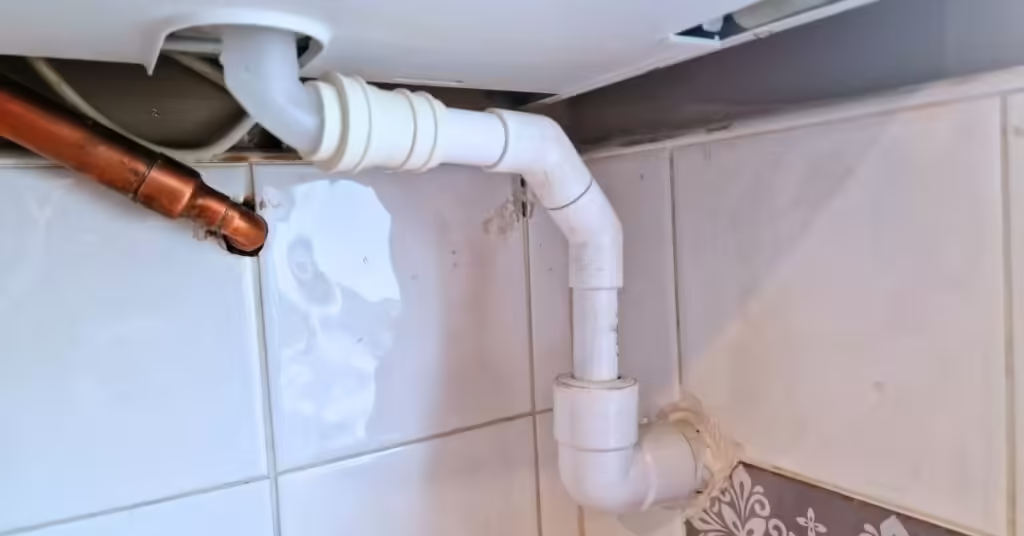
Hi, all my radiators are hot, apart from one. This has never happened before. which is odd. The pipes on either side of the radiator are stone cold and therefore this particular radiator is completely cold. I opened the bleed screw at the top and cold water comes out (so no air in the radiator). Please can you advise? Thanks
Hi Dom, it could be an airlock. Turn off all the radiators apart from the cold one. If it heats up then you can balance the system, if it doesn’t then you’ve probably got a pipe or valve problem.
Thanks Steven. Today I turned off as many radiators as I could (some have inaccessible TRVs). I took the TRV off the cold radiator and pressed the pin to check that it would move. I couldn’t do it with my finger, so used the handle of a screwdriver to push in in and out. This seemed to be moving (it might have been a bit stiff on the first push but it got moving immediately on second push). Put the TRV back on. Turned the heating on and left it for half an hour. This radiator was still cold. I took off the TRV again from the cold radiator and as soon as it popped off, I could hear the gurgling and flow of water trickling into the radiator which was a good sign. After a few seconds that pipe and radiator started warming up. I then went to all the other radiators that I had turned off previously. I removed the TRVs on those and pressed the pin in and out a few times and they all started to heat up! After they all reached a nice level of heat, I fitted the TRVs on. Fortunately, I had a brand new TRV sitting in the cupboard, so fitted that to the original radiator in question and all is working well. Thanks for your help Steven and hope this post helps someone.
Good job Dom, glad you got it sorted and thanks for your detailed response which will no doubt help other people.
We had British Gas out to service our boiler last month. When we put the heating on we had no heat ( working perfect ) last winter.
Husband drained all the rads bled them, the only rad working is in the kitchen which is vertical. Boiler is a combi. Any suggestions. Thank you
Not sure what you mean, if you only have one radiator working then make sure all the other radiator valves are fully open and try closing one valve on the hot radiator, then check if any other radiators get hot
I had two radiators replaced and I find the bottom of the radiators are cold also the pipe at the thermostat is cold and the lockshiield valve is hot.
typically radiators being cold at the bottom is because of sludge being in there, but if they’ve never been hot at the bottom, it could be a valve or pipework problem. Or, possibly the radiator was fitted the wrong way around as some radiators have specific sides that the flow (inlet) and return (outlet) need to be on.
I had a email from the installer saying I need 22 mmm pipes because the new radiator is 20.000 btus.
you could try balancing the system to force more heat to that radiator https://housewarm.co.uk/blog/heating/balance-radiators/
I will try doing that, I don’t use the bedroom rads only the bathroom upstairs out of 8 rads I only use 3.
you should turn all the radiators off apart from the problematic one to see if it heats up properly. if it doesn’t then it’s probably a pipe or valve problem. if it does then balance the system.
One large standard radiator (last one I think) in conservatory is cold and the pipes leading in and out are cold as well. It doesn’t need bleeding. There is an another large modern “ladder” rad in the dining room which is only about a meter away which is working fine. ???
Turn all the radiators off apart from the cold one. If it heats up then you can balance the system, if it doesn’t then you’ve probably got a pipe or valve problem.
My radiators were cold at the top and warm at the bottom, we’ve bled them but now the ones on the top floor are the only ones working and the downstairs ones won’t heat up – pressure gage has gone up to 3 when it normally rests between 1 and 2, what should I do?
Sounds like you’ve increased the pressure too much and need to release some. The easiest way is to bleed water out of a radiator. This guide might help https://housewarm.co.uk/blog/heating/boiler-pressure-too-high/
Thank you – We have bled one of the radiators and the pressure gage got down to 1.5 – now back up at 2 with the heating on, the new issue is that the radiators are now all not heating up at really at all. Any more advice? Appreciate all your help!
Try turning the radiator temperature up at the boiler (not the thermostat)
New vertical rad fitted in sun room by tapping in to 15mm pipes upstairs. Rad warms at the inlet but doesn’t get hot. Circ pump on no.3 made it a bit hotter but don’t want to lanour the pump. Needs balancing? More powerful circ pump? Thanks.
On some vertical radiators the flow and return pipes have to go on a specific side of the rad, if they’re not it can cause problems. You might be able to flip it around if it’s a double column rad.
I would try closing all the other radiators first, see if it gets hot. If not then flip it around or swap the pipes under the floor. If it gets super hot then just balance the other radiators.
Hi, I’m losing my mind. Had a plumber out because one radiator not working. They drained the system, checked the valves etc and determined the problem wasn’t the radiator but likely a blockage in pipes leading to radiator which would need to be looked at another time. Refilled system, heating back on and now 2 other radiators (3 total) will not heat up! They were working fine before; they were roasting hot before but now cold. Any ideas please?
Hi Maria,
Sounds like an airlock. Try turning all the hot radiators off and that’ll force the heat to the cold radiators, that should clear the airlock. Then open all the radiators when the cold ones get hot.
Hi, vertical radiator only gets warm, but pipe is roasting. Checked everything else, been flushed etc. We have moved this rad from another room, wasn’t that hot in other room, but wasn’t used much.
Hi Maggs,
Sometimes vertical radiators just don’t get as hot as other radiators. I would balance the system to get some heat from the hotter radiators forced to that warm one.
Since I had a radiator moved in my kitchen to another wall the radiator on the other side of the wall in front room doesn’t get hot. The thermostat pipe gets warm but the lock shield valve pipe is cold
Sounds like a pipework problem, possibly capped one of the pipes off to that radiator when removing the other one.
It could be an airlock though. Make sure both valves are fully open, close one valve on every other radiator and turn the heating on. More info here https://housewarm.co.uk/blog/heating/radiator-airlock/
Main radiator only half of it is heating
If the top half of the radiator is not heating up, you will need to bleed the air out of the radiator. If the bottom half is cold, you will probably need to clean the sludge out.